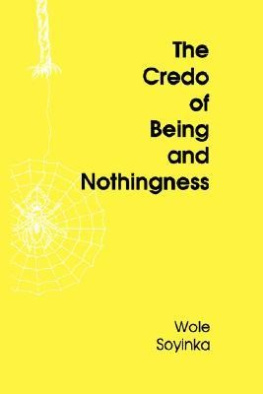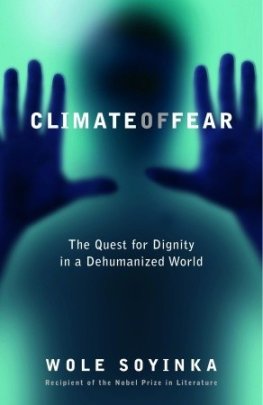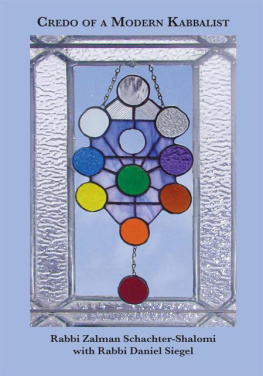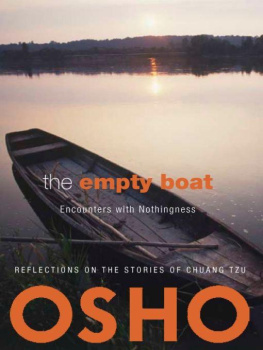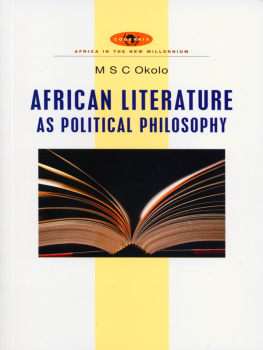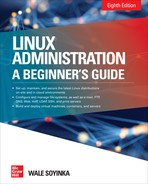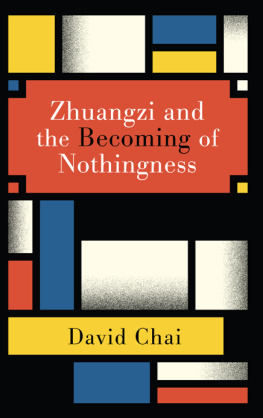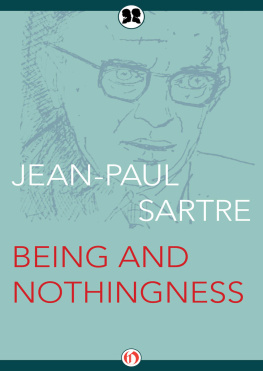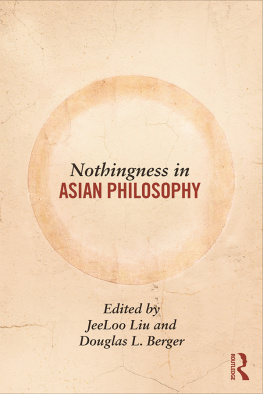Wole Soyinka - The Credo of Being and Nothingness
Here you can read online Wole Soyinka - The Credo of Being and Nothingness full text of the book (entire story) in english for free. Download pdf and epub, get meaning, cover and reviews about this ebook. year: 2000, publisher: Spectrum Books Ltd, genre: Religion. Description of the work, (preface) as well as reviews are available. Best literature library LitArk.com created for fans of good reading and offers a wide selection of genres:
Romance novel
Science fiction
Adventure
Detective
Science
History
Home and family
Prose
Art
Politics
Computer
Non-fiction
Religion
Business
Children
Humor
Choose a favorite category and find really read worthwhile books. Enjoy immersion in the world of imagination, feel the emotions of the characters or learn something new for yourself, make an fascinating discovery.
- Book:The Credo of Being and Nothingness
- Author:
- Publisher:Spectrum Books Ltd
- Genre:
- Year:2000
- Rating:3 / 5
- Favourites:Add to favourites
- Your mark:
- 60
- 1
- 2
- 3
- 4
- 5
The Credo of Being and Nothingness: summary, description and annotation
We offer to read an annotation, description, summary or preface (depends on what the author of the book "The Credo of Being and Nothingness" wrote himself). If you haven't found the necessary information about the book — write in the comments, we will try to find it.
The Credo of Being and Nothingness — read online for free the complete book (whole text) full work
Below is the text of the book, divided by pages. System saving the place of the last page read, allows you to conveniently read the book "The Credo of Being and Nothingness" online for free, without having to search again every time where you left off. Put a bookmark, and you can go to the page where you finished reading at any time.
Font size:
Interval:
Bookmark:
A s a Buddhist, I believe we should be particularly aware of the threat of a "holy frenzy." It is quite natural that individuals atomized by the secular mass society should be drawn to religion in quest of spiritual healing or the recovery of a sense of spiritual wholeness. But what lies ahead for them is not always brightness and light: witness the revival of fundamentalist movements and the proliferation of new religions with their anti-rational, anti-intellectual cults and self-styled prophets. We must beware of religions that turn their backs on the progress of history and society, and of the tendency to do so that is inherent in all religions.
"Holy frenzy" refers to the fundamentalist forces christian, judaic, islamic or other that are hostile to secularism.
Daisaku Ikeda, President,
Soka Gakkai International (SGI)
I do not claim to know what has been the experience of others but, as a child, I found myself frequently indulging in a rather exotic mental exercise. It was an exercise which originated from my attempts to come to concrete terms with the christian myth of the creation of the world.
In the beginning, claim the christian scriptures, there was Void. Emptiness. My imagination insisted on conjuring up this primeval state and ended up by evolving the quite logical exercise: I would shut my eyes, shut off my mind, then try to enter that primal state of nothingness which the world would have been, before the creation of anything, animate or inanimate. It became quite a compulsive indulgence. I found myself impelled by a curiosity to experience the absolute state of non-being, of total void no trees, no rocks, no skies, no other beings, not even I.
All I can recall today from that phase was the experience of dizziness. My head would begin to spin and I became somewhat scared. It did not stop me putting myself through the same cerebral wringer over and over again. I can only wonder, at this distant remove, how I would have been affected at that impressionable age, by the knowledge that adults have actually constructed complex philosophical and religious systems in which all material life, including all those dynamic processes for the reproduction of life which in fact constitute our social consciousness or value of being, are actually conceived as a programmed reversion towards that very state of nothingness, the primal zero, which I then tried vainly to experience. Obviously I should have saved myself the trouble and waited until I could read it all in books, heard it in sermons and glimpsed it through guaranteed meditative routes such as those prescribed in Buddhism. How was I to know that sages and visionaries of various persuasions had already perfected their own spiritual paths towards that individual, or collective state of negation.
T his exercise must not be confused with a related kind which is far more common among children, that being the attempt to experience death. My shared recollection of childhood games with some colleagues in mature indicate that this is quite a popular childhood indulgence. Sometimes it even results, accidentally, in the real thing. The children locks himself in a dark cupboard, trunk or disused refrigerator and simply suffocates to death. No, the exercise to which I refer is quite different. The latter, the death mimesis, is a game which is played against the accepted reality of existence. The former, by contrast, attempts to deny or efface existence altogether. This former, I would recognise much much later as being akin to what Buddhists undergo as part of their spiritual training empty your mind, shed your flesh, your beingness ... dissolve in the void itself and experience Nirvana.
W hat christians and moslems share with buddhism is not so much Nirvana as its universalised state Mahapralayi. This expression offers a loose distinction which I had better qualify. I do not deny that there are states of individual contemplation in christianity and islam which approach the ideal of Nirvana. Certainly some of the fundamentalist sects even of a cultic temper in either religion, indulge in this exercise of intensive inward dissolution which equates the buddhist Nirvana. But the orthodox bodies do not encourage them; indeed, they are viewed with suspicion, as deviant and dangerous, even diabolic. The Universal Day of Judgement, guaranteed by both, is the concept I can propose which comes closest to the condition of universal nothingness, the in-folding of the world as we know it into the original womb of darkness, or more accurately, non-darkness and non-light. The main differentiation between Mahapralayi and Day of Judgement is however a crucial, even cheerful one. The material world we know disappears, in the latter case, but it is revived on a different plane, as Paradise, Purgatory or Hell. In the islamic Book of the Dead, it is expressed in language not that dissimilar from the christian creed of Resurrection:
" I have believed in Allah, and His angels, and His books, and His messengers, and the Last Day and the decree of its good and evil from Allah-ta'alla, and in the Rising after death."
Mahapralayi, by contrast, is a return to primal void. To transcend present existence therefore, we need not wait for the equivalent of Mahapralayi, the Final Day of Judgement, or All Souls' Day. All we need to do is die, having led a good life, and we shall be wafted to another state of being. In some cases, of course, especially in aspects of islamic preaching, it also helps to have died fighting a holy war. That way, transition into paradise is instant. The christians appear to be more procedural there is temporary halt at the gates where your credentials are checked. After that there is also the halfway house called Purgatory.
At one conceptual level or the other therefore, deeply embedded as an article of faith, is a relegation of this material world to a mere staging-post, awaiting the drop of the final grain of sand into the lower half of the hour-glass, then universal negation gently or cataclysmically. Existence, as we know it, comes to the end that was pre-ordained from the beginning of time. Indeed, time itself comes to an end. In the solitary confinement of prison, when time weighed heavily on my mind and showed no inclination to come to a desired end, I found myself contesting that very element, time, by reverting to my childhood exercises, the negation of existence. Of course, this time, I was armed with the knowledge of others. I even had the grisly trigger of a number of condemned men walking towards their last moment on earth, their footsteps receding into a permanently fading echo in the mind. Without too much effort, beyond the simple routine of fasting, I found myself drifting into this curious state of the incorporeality, not only of myself, but of the surrounding world. It resulted in the poem, Mahapralayi. Hopefully, you may share some of that projection in the following lines from the poem:
a spring is touched by appointed fingers
and whirlwings fold into the dark
a glacier mind of all-being
slows to a last enduring thought
a deadweight seal of silence sways
upon the secret at this wake
none keeps vigil. None.
That background is necessary to understand why I, for one, failed to understand why my fellow Nigerians, especially of the christian persuasion, got so excited when that great intellectual, sage, philosopher, religious leader and man of peace, Sheik Humiliate uttered his memorable words: "christianity is nothing." Now I know that christians will say that I can afford such detachedness because I am not a christian, but they would be wrong. The truth is simply that, having raised myself as an experimenting spiritualist of nothingness since childhood, graduating, under prison conditions, into even deeper illumination into the profundities of nothingness, I was able to grasp at once that Sheik Gumi was paying christianity one of the most enlightened compliments in the calendar of piety. We have to recall his exact words: "christianity is nothing." An objective, deeply thought-out statement. Compare it if you like, to these words from the buddhist mystic Malarepa, words which I recited as lines of self-abnegation in a section of
Font size:
Interval:
Bookmark:
Similar books «The Credo of Being and Nothingness»
Look at similar books to The Credo of Being and Nothingness. We have selected literature similar in name and meaning in the hope of providing readers with more options to find new, interesting, not yet read works.
Discussion, reviews of the book The Credo of Being and Nothingness and just readers' own opinions. Leave your comments, write what you think about the work, its meaning or the main characters. Specify what exactly you liked and what you didn't like, and why you think so.

